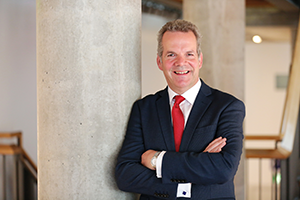Saving money by planning ahead
Scottish Futures Trust’s Barry White is tasked with saving taxpayers’ money while making sure the country’s infrastructure is fit for purpose.
The next five years are going to be “incredibly tough,” says Scottish Futures Trust Chief Executive Barry White. With the gradient of cuts expected to be much steeper in the years to come, the County Antrim native needs to constantly think ahead in order to meet the shifting demands of the country.
Securing value for money, White says, always goes back to six simple questions – what, where, why, when, who and how? During 2013-2014, the Scottish Futures Trust helped make £139 million net benefits and savings.
“What makes for good infrastructure procurement is spending time up front being really clear on what it is you want, why you need it and what it is you are going to do,” he explains. “Thereafter, getting the right people to procure it.”
A good example of this, White points out, is Glasgow’s new hospital where staff gave their input on how the £842 million project could meet the needs of patients and the workforce. A lot of the work was done upfront: “It went through procurement and into construction and during construction, there were no changes made by consultants or by medical staff to increase the cost of that project.”
Some money-saving changes were made when it was realised that certain aspects were not needed. He explains: “It’s that rigour upfront that makes a difference because if you start off a project and chop and change half-way through, the costs can start to spiral.”
While delivering a project on time and on budget may be viewed as a success, it is no good if it’s the wrong thing.
The Scottish Futures Trust manages a non profit distributing (NPD) programme valued at £3.5 billion, developed as an alternative to the private finance initiative (PFI) model.
PFI fell out of favour with Scotland before it fell out of favour with the rest of the UK. “We looked to see how you could improve that.
“We capped returns to the private sector,” says White. “But we’ve also made the projects much more flexible. We’ve made the contract stronger so we negotiate a better deal with the private sector. What it means is that we are getting investment into infrastructure over and above capital budgets.”
The Scottish Government aims to lead a world class digital nation by 2020, helped by the Digital Scotland superfast broadband programme. The first phase is connecting the highlands and islands and the rest of Scotland.
White comments: “It is putting both government money and European money and BT’s money into rural broadband so it’s been the biggest sub-sea cabling exercise linking broadband up onto the islands, to get highspeed up onto the islands and rural areas.”
The next phase is working with mobile phone companies, BT and Virgin Media to understand what can be done to enable ultrafast broadband to happen by 2020.
The third part is demonstrating digital i.e. working with small projects that generate low cost broadband for housing associations or mobile phone networks in remote areas “and using that as a template to let other people then do more of that.”
White, who is originally from Templepatrick, first moved to Scotland at the age of 18 to study at Edinburgh University. When asked what Northern Ireland could learn from his adopted homeland, he says: “First of all, I think every country could look elsewhere and learn things from other people. I think we’ve had a good, stable government in Scotland which I think has been really helpful.”
White affirms: “I think for us, in terms of doing things, that has actually been one of the great helps – that we’ve been able to get good political support behind infrastructure planning and that has helped enormously.”






